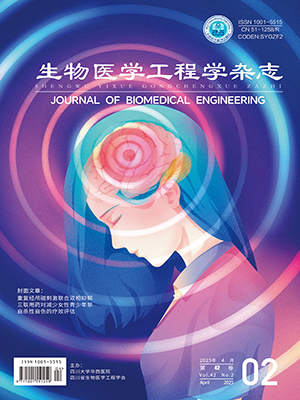| 1. |
Chen W, Zheng R, Baade P, et al. Cancer statistics in China, 2015. CA-Cancer J Clin, 2016, 66(2): 115-132.
|
| 2. |
Jiang Y, Ma D, Suo C, et al. Genomic and transcriptomic landscape of triple-negative breast cancers: subtypes and treatment strategies. Cancer cell, 2019, 35(3): 428-440.
|
| 3. |
Denkert C, Liedtke C, Tutt A, et al. Molecular alterations in triple-negative breast cancer-the road to new treatment strategies. Lancet, 2017, 389(10087): 2430-2442.
|
| 4. |
Wang Z, Chen J, Zhong M Z, et al. Overexpression of ANLN contributed to poor prognosis of anthracycline-based chemotherapy in breast cancer patients. Cancer Chemoth Pharm, 2017, 79(3): 1-9.
|
| 5. |
Garrido-Castro A, Lin N, Polyak K. Insights into molecular classifications of triple-negative breast cancer: improving patient selection for treatment. Cancer Discov, 2019, 9(2): 176-198.
|
| 6. |
Zhu J, Thompson C. Metabolic regulation of cell growth and proliferation. Nat Rev Mol Cell Bio, 2019, 20(7): 436-450.
|
| 7. |
Kamphorst J, Gottlieb E. Cancer metabolism: friendly neighbours feed tumour cells. Nature, 2016, 536(7617): 401-402.
|
| 8. |
Wagner E, Petruzzelli M. Cancer metabolism: A waste of insulin interference. Nature, 2015, 521(7553): 430-431.
|
| 9. |
Tasselli L, Chua K. Cancer: metabolism in 'the driver's seat. Nature, 2012, 492(7429): 362-363.
|
| 10. |
Cao Y. Adipocyte and lipid metabolism in cancer drug resistance. J Clin Invest, 2019, 129(8): 3006-3017.
|
| 11. |
Yang W, Bai Y, Xiong Y, et al. Potentiating the antitumour response of CD8+ T cells by modulating cholesterol metabolism. Nature, 2016, 531(7596): 651-655.
|
| 12. |
Ma X, Bi E, Lu Y, et al. Cholesterol induces CD8+ T cell exhaustion in the tumor microenvironment. Cell Metab, 2019, 30(1): 143-156.
|
| 13. |
Ehmsen S, Pedersen M H, Wang G, et al. Increased cholesterol biosynthesis is a key characteristic of breast cancer stem cells influencing patient outcome. Cell Rep, 2019, 27(13): 3927-3938.
|
| 14. |
Jiang Y, Sun A, Zhao Y, et al. Proteomics identifies new therapeutic targets of early-stage hepatocellular carcinoma. Nature, 2019, 567(7747): 257-261.
|
| 15. |
Gruosso T, Gigoux M, Vsk M, et al. Spatially distinct tumor immune microenvironments stratify triple-negative breast cancers. J Clin Invest, 2019, 129: 1785-1800.
|
| 16. |
Soccio R E. The STARD4 subfamily: STARD4 and STARD5 in cholesterol metabolism// Clark B J, Stocco D M. Cholesterol transporters of the START domain protein family in health and disease. New York: Springer, 2015: 139-171.
|
| 17. |
Zhang M, Xiang Z, Wang F, et al. STARD4 promotes breast cancer cell malignancy. Oncol Rep, 2020, 44(6): 2487-2502.
|
| 18. |
Iaea D B, Mao S, Lund F W, et al. Role of STARD4 in sterol transport between the endocytic recycling compartment and the plasma membrane. Mol Biol Cell, 2017, 28(8): 1111-1122.
|
| 19. |
Calderon-Dominguez M, Gil G, Medina M A, et al. The StarD4 subfamily of steroidogenic acute regulatory-related lipid transfer (START) domain proteins: New players in cholesterol metabolism. Int J Biochem Cell B, 2014, 49: 64-68.
|
| 20. |
Shen M, Jiang Y Z, Wei Y, et al. Tinagl1 suppresses triple-negative breast cancer progression and metastasis by simultaneously inhibiting Integrin/FAK and EGFR signaling. Cancer Cell, 2019, 35(1): 64-80.
|
| 21. |
Xiao Y, Li Y, Tao H, et al. Integrin α5 down-regulation by miR-205 suppresses triple negative breast cancer stemness and metastasis by inhibiting the Src/Vav2/Rac1 pathway. Cancer Lett, 2018, 433: 199-209.
|
| 22. |
Chandrashekar D S, Bashel B, Balasubramanya S A H, et al. UALCAN: a portal for facilitating tumor subgroup gene expression and survival analyses. Neoplasia, 2017, 19(8): 649-658.
|
| 23. |
Yu R, Longo J, Van Leeuwen J, et al. Statin-induced cancer cell death can be mechanistically uncoupled from prenylation of RAS family proteins. Cancer Res, 2018, 78(5): 1347-1357.
|
| 24. |
Sukhanova A, Gorin A, Serebriiskii I G, et al. Targeting C4-demethylating genes in the cholesterol pathway sensitizes cancer cells to EGF receptor inhibitors via increased EGF receptor degradation. Cancer Discov, 2013, 3(1): 96-111.
|
| 25. |
Luo J, Yang H, Song B L. Mechanisms and regulation of cholesterol homeostasis. Nat Rev Mol Cell Bio, 2020, 21(4): 225-245.
|
| 26. |
Liu X, Taftaf R, Kawaguchi M, et al. Homophilic CD44 interactions mediate tumor cell aggregation and polyclonal metastasis in patient-derived breast cancer models. Cancer Discov, 2018, 9(1): 96-113.
|
| 27. |
Gomes A P, Ilter D, Low V, et al. Dynamic incorporation of histone H3 variants into chromatin is essential for acquisition of aggressive traits and metastatic colonization. Cancer Cell, 2019, 36(4): 402-417.
|
| 28. |
Plaks V, Kong N, Werb Z. The Cancer Stem Cell Niche: How essential is the niche in regulating stemness of tumor cells?. Cell Stem Cell, 2015, 16(3): 225-238.
|
| 29. |
Hamidi H, Ivaska J. Every step of the way: integrins in cancer progression and metastasis. Nat Rev Cancer, 2018, 18(9): 533-548.
|




